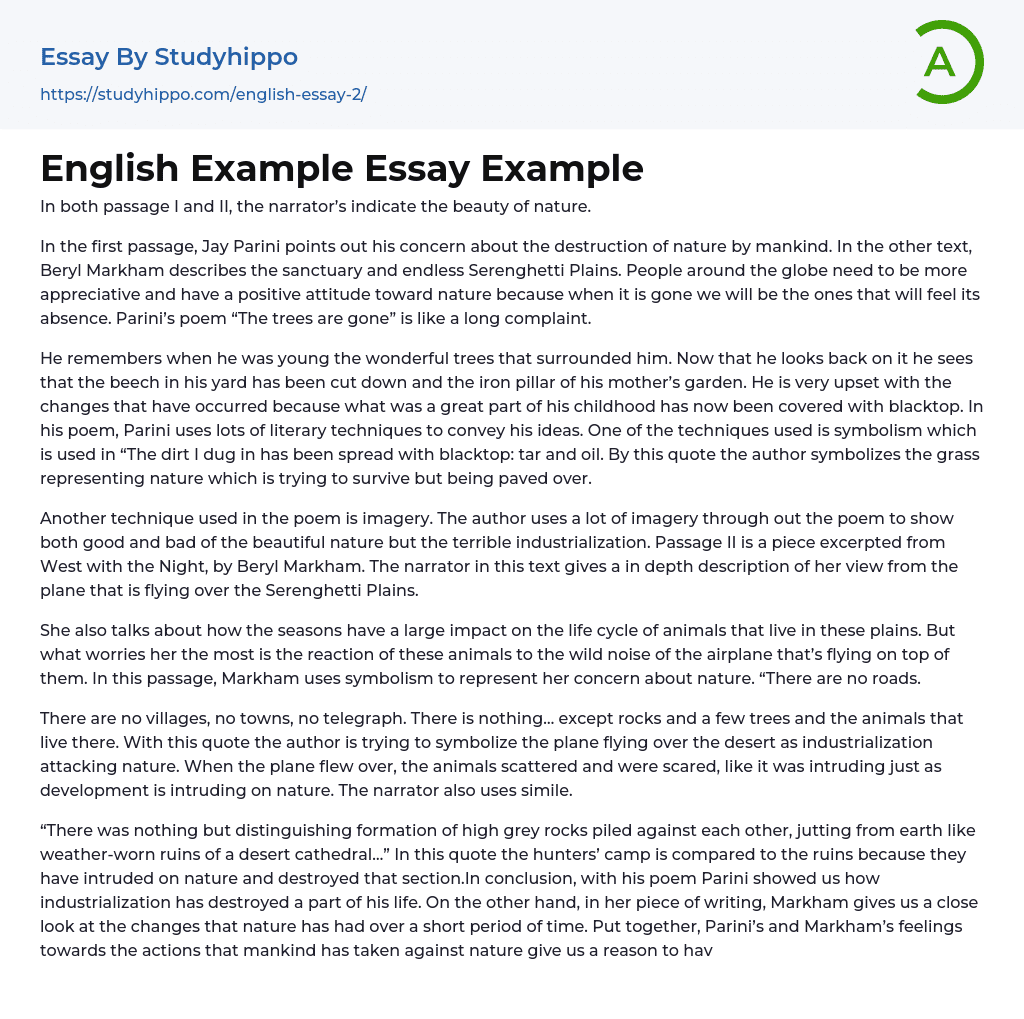The narrator expresses admiration for nature in both passages I and II.
Jay Parini expresses his worry over the human-caused destruction of nature, while Beryl Markham describes the beauty of the Serengeti Plains. It is important for people worldwide to value and respect nature, as we will be the ones to feel its absence when it is gone. Parini's poem, "The trees are gone," is a lament for this loss.
Reflecting on his youth, the author fondly recalls the beautiful trees that surrounded him. However, upon reflection, he notes the absence of the beech tree from his yard and the replacement of his mother’s garden with an iron pillar. The author expresses sadness over these changes as they have covered a significant part of his childhood with blacktop. In his poem, Parini employs various literary techniques including symbolism. One
...such example is found in the quote “The dirt I dug in has been spread with blacktop: tar and oil,” which represents the grass and nature attempting to persist despite being paved over.
The poem employs imagery as a technique to depict the positive and negative aspects of nature and industrialization. Additionally, Passage II is an extract from West with the Night, authored by Beryl Markham. The narrator of the text provides a detailed account of the view she observes while flying over the Serenghetti Plains in an airplane.
Symbolism is employed by Markham in expressing her anxiety for nature. She discusses how the life cycle of animals residing in these plains is greatly influenced by the different seasons. Nonetheless, her greatest concern is the animals' reaction to the loud noise emanating from the airplane hovering above them. The
absence of roads is emphasized as Markham highlights her point.
The absence of villages, towns, and telegraph alongside the presence of only rocks, trees, and animals represents the plane's invasion of nature, paralleling industrialization's attack. The animals' scattering and fear at the plane's presence mirrors development's intrusion on nature. The narrator employs simile to convey this message.
Parini's quote compares the hunters' camp to weather-worn ruins of a desert cathedral, highlighting the destruction of nature caused by their intrusion. Parini's poem demonstrates how industrialization has destroyed a part of his life. In contrast, Markham's writing offers insight into the swift changes in nature. Both Parini and Markham illustrate the negative impact of mankind's actions against nature, emphasizing the need to adopt a more positive attitude towards it, as we will suffer the consequences of its absence.
- Childhood Memory essays
- Child essays
- Childcare essays
- Child labor essays
- Doll essays
- Academia essays
- Higher Education essays
- Language Learning essays
- Studying Business essays
- Education System essays
- Study essays
- First Day of School essays
- Scholarship essays
- Pedagogy essays
- Curriculum essays
- Coursework essays
- Studying Abroad essays
- Philosophy of Education essays
- Purpose of Education essays
- Brainstorming essays
- Educational Goals essays
- Importance Of College Education essays
- Brown V Board of Education essays
- The Importance Of Higher Education essays
- Online Education Vs Traditional Education essays
- Academic And Career Goals essays
- Academic Integrity essays
- Brown Vs Board Of Education essays
- Distance learning essays
- Technology in Education essays
- Vocabulary essays
- Writing Experience essays
- Importance of Education essays
- Early Childhood Education essays
- Academic Degree essays
- Academic Dishonesty essays
- School Uniform essays
- Academic writing essays
- Cheating essays
- Bachelor's Degree essays
- MBA essays
- College Life essays
- Grade essays
- Diploma essays
- Phonology essays
- Sentence essays
- Filipino Language essays
- Pragmatics essays
- Millennium Development Goals essays
- History Of Education essays




